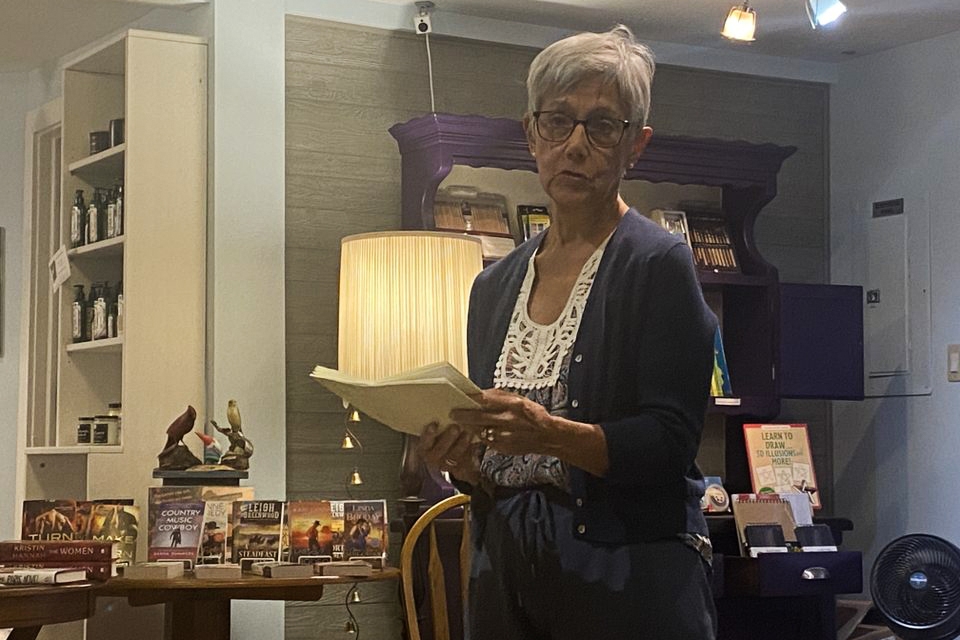One town over from Glassboro, just a short ten-minute drive from Rowan’s main campus, sits the bustling street of Broadway in Pitman.
Similar to Rowan Boulevard in the amount of foot traffic, this street is populated by a more diverse population of ages than the areas surrounding Rowan, which are largely frequented by students.
The types of businesses are also different, with more small businesses and fewer chain stores that the Boulevard boasts. One such small business, easily identifiable by the window display full of vintage typewriters, is the Words Matter bookstore.
Upon entry, customers are greeted by a large open space with a couch and a series of round wooden tables lining the area, displaying books, journals, candles, and pens. One wall hosts a variety of tea, mugs, and kettles, while another sports a hutch painted deep purple with all of the drawers pulled out to display art supplies.
Outside of selling their wares out of the large front room and a smaller back room that is set aside for store-branded merchandise and children’s and used books, the store also serves as the monthly meeting place for a group of poets to hold their open mic night.
Held on the second Tuesday of every month, anyone interested in sharing some of their writing, prose, or verse, can sign up on the sheet that is passed around at the beginning of the meeting, then file into one of the seats in the two rows of folding chairs.
Tom Loper, a Wilmington resident and writer of his own chapbook “A Spring of Roses,” acted as the MC for the night, starting the night off with some of his poems.
Beginning with light-hearted, tongue-in-cheek poems with pop culture references, Loper then transitioned to more serious, emotional works.
He also explained the concept of found poems to the group, in which the poet goes out into the world and uses words they see on signs, books, menus, or anywhere else they may appear.
Loper himself used words he was able to read off of weathered headstones in an old churchyard cemetery he had walked through for a poem entitled “Pen City.”
“Most of the lot of stones were completely smooth, just like nothing. Some of the stones you could make out some of the inscriptions, some of them were very clear. I just went along and I grabbed fragments from the headstones,” said Loper.
Another poem by Kaylee Wagner spoke to the feeling of mourning what could have been but ultimately realizing that accepting things as they are and looking forward was a better way to live life.
With the reading taking place on September 10, one poet took the opportunity to reflect on his personal experience with grief and anniversary, reading the tribute to his mother he originally wrote for her funeral on the 35th anniversary of her death.
Lynne Nelson, another writer present to read to the group, took the opportunity to switch things up and write a humorous personal essay.
Her tale, “The Softer Side of Violence,” told the story of when her daughters were young girls being tormented by a neighborhood boy, Jimmy, until she one day sprayed him with her garden hose. The next day, his mother came storming into the craft store that Nelson owned and operated out of the front of her house, making Nelson believe the other woman was there to do her bodily harm.
“‘I need baby pink pom poms, not the bright pink ones… do you sell baby pink pom poms? I was working on a project, and I ran out,’” Nelson quoted Jimmy’s mother as saying.
Loper wrote a poem on his memories of 9/11. Titled “Karen, My God, I Love You,” it told the story of someone trapped in one of the towers writing a note to a loved one and letting it float down to the street in the hopes that it would somehow make its way to its intended recipient.
“I remember seeing paper, 1000s of pieces of paper in the breeze just kind of floating… And I thought paper is such a fragile thing… it’s coming down onto massive blocks of steel aluminum and concrete. And I’m thinking of these fragile papers just surviving,” said Loper.
Carol Smith, an instructor of college composition at Rowan University and a member of Poets Against Racism and Hate, shared two poems, one about aging and another about the debate over changing the name of Columbus Day to Indigenous Peoples’ Day.
“Shameful to rename this day, shameful to consider a new name sufficient,” said Smith, reading the ending line of her poem.
As the names on the sign-up list ran out, the event came to a close with one last call for anyone who wanted to read. When no one took the offer, poets mingled as they perused the store and made their way to the exit and onto the street
For comments/questions about this story DM us on Instagram @thewhitatrowan or email [email protected].























































































































































!["Working with [Dr. Lynch] is always a learning experience for me. She is a treasure,” said Thomas. - Staff Writer / Kacie Scibilia](https://thewhitonline.com/wp-content/uploads/2025/04/choir-1-1200x694.jpg)









































